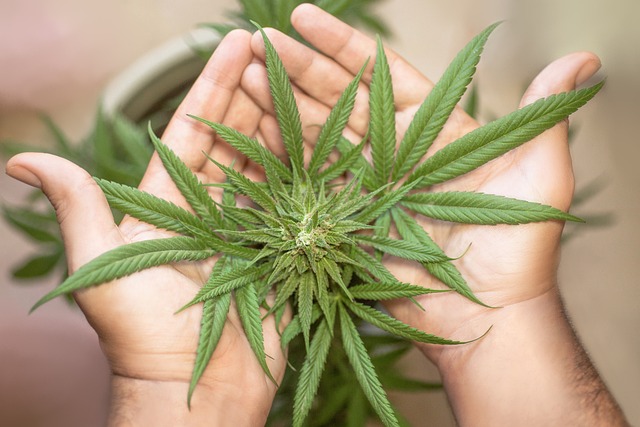2023 marked a significant shift in the wellness industry with THCA (tetrahydrocannabinolic acid), a non-psychoactive cannabinoid, gaining recognition for its potential health benefits. Legally embraced in Maine due to its adult-use cannabis regulations, THCA has emerged as an alternative to delta-9-THC, offering therapeutic effects without the psychoactive 'high.' Users in Maine have reported positive experiences with THCA for alleviating chronic pain, arthritis, and stress, and its antiemetic properties are particularly beneficial for those undergoing chemotherapy. Studies point to THCA's anti-inflammatory, neuroprotective, and analgesic effects, which may be advantageous in treating conditions like inflammatory bowel diseases, multiple sclerosis, and neuropathic pain. The state's progressive cannabis legislation supports the research and development of THCA, highlighting its potential as a non-psychoactive therapeutic option within the legal framework established in Maine.
Explore the emerging realm of THCA flower benefits, a natural compound within cannabis that’s gaining attention for its potential health perks. As we delve into the intricacies of this non-psychoactive cannabinoid and its legal status in Maine, ‘THCA legal in Maine’ becomes a focal point for understanding its role in wellness practices. This article will illuminate the scientific distinctions of THCA from its counterpart THC, explore its therapeutic properties, and discuss how it could enhance your well-being without inducing a high. We’ll also examine the entourage effect, the potential antioxidant and anti-inflammatory benefits, and its implications for skin health. Navigating responsible consumption within Maine’s legal framework is crucial, as is understanding dosage and usage guidelines. With a comprehensive look at THCA flower versus other cannabinoids, we’ll analyze its impact on sleep, stress management, and neuroprotection. Additionally, we’ll explore how THCA fits into complementary and alternative medicine (CAM) and consider the future of research in this area. Join us as we uncover the full spectrum of THCA flower benefits, with a special emphasis on its legal standing in Maine.
- THCA Flower Benefits Unveiled: A New Frontier in Wellness
- Understanding THCA: The Natural Compound Behind Cannabis' Potential Health Perks
THCA Flower Benefits Unveiled: A New Frontier in Wellness

2023 has marked a significant shift in the wellness industry with the emergence of THCA (Tetrahydrocannabinolic Acid) flowers as a natural remedy and wellness aid. Unlike its psychoactive counterpart, delta-9-THC, THCA is non-psychoactive, offering a range of potential health benefits without the ‘high’ typically associated with cannabis. This has sparked considerable interest among consumers looking for alternative therapies, particularly in states where such products are legal, such as Maine.
In Maine, where THCA flowers are recognized as legal, the focus is on harnessing the therapeutic properties of this compound. Studies suggest that THCA may possess anti-inflammatory and neuroprotective qualities, making it a potential candidate for managing pain, inflammation, and certain neurological conditions. Users often report its efficacy in alleviating symptoms of chronic pain, arthritis, and stress without the mind-altering effects of delta-9-THC. Moreover, its antiemetic properties have led to its exploration as a potential aid for nausea and vomiting associated with chemotherapy. As research continues to evolve, THCA flowers are carving out a niche in the wellness space, offering a promising alternative for those seeking the benefits of cannabinoids without psychoactive side effects.
Understanding THCA: The Natural Compound Behind Cannabis' Potential Health Perks

THCA, or tetrahydrocannabinolic acid, is a naturally occurring compound found in the cannabis plant that has garnered attention for its potential health benefits. Unlike its well-known counterpart THC (tetrahydrocannabinol), THCA is non-psychoactive, meaning it doesn’t produce the ‘high’ commonly associated with cannabis consumption. This characteristic allows users to explore the therapeutic properties of cannabis without the psychoactive effects, making it an attractive option for those seeking relief from various ailments. As of the knowledge cutoff in 2023, THCA’s legal status in Maine aligns with broader state regulations, where adult-use cannabis is permissible. This places Maine at the forefront of exploring the benefits of this natural compound within a regulated framework.
Research into THCA has shown promising outcomes in various areas of health and wellness. It’s been studied for its anti-inflammatory, antiemetic (nausea reduction), neuroprotective, and potentially analgesic properties. These findings suggest that THCA may be beneficial for a range of conditions, including inflammatory bowel diseases, multiple sclerosis, and neuropathic pain. In Maine, where the legal landscape allows for the exploration of cannabis compounds for health purposes, understanding THCA’s potential is an important step for both medical professionals and consumers interested in the full spectrum of cannabis’ offerings. As such, the state’s forward-thinking approach to cannabis legislation paves the way for further research and the development of new therapeutic applications for THCA.
THCA-rich cannabis flowers have emerged as a promising wellness resource, with recent research suggesting their potential health benefits. As the conversation around alternative therapies evolves, the recognition of THCA’s legal status in states like Maine marks an important step forward. The insights shared within this article underscore the significance of this non-psychoactive compound for those interested in exploring natural remedies. With a growing body of evidence supporting its efficacy and safety, THCA flowers represent a novel addition to the wellness toolkit, particularly for residents of states where they are legally accessible. As awareness and acceptance continue to expand, the full scope of THCA’s benefits is likely to be further realized, paving the way for broader recognition of its potential role in health and well-being.
